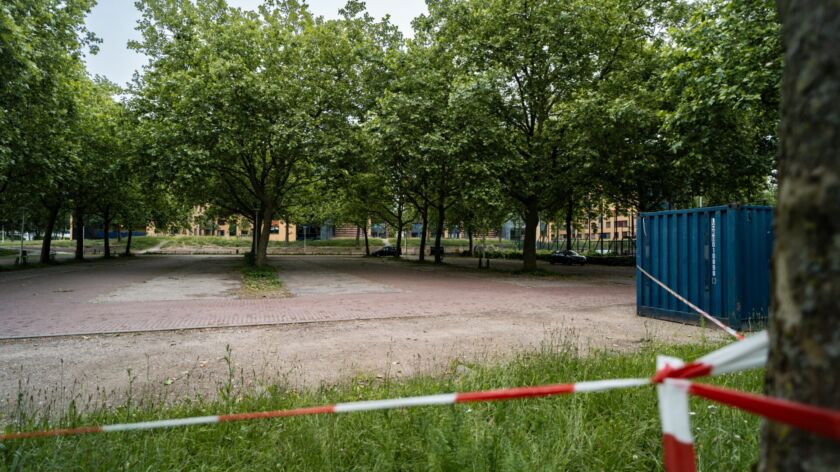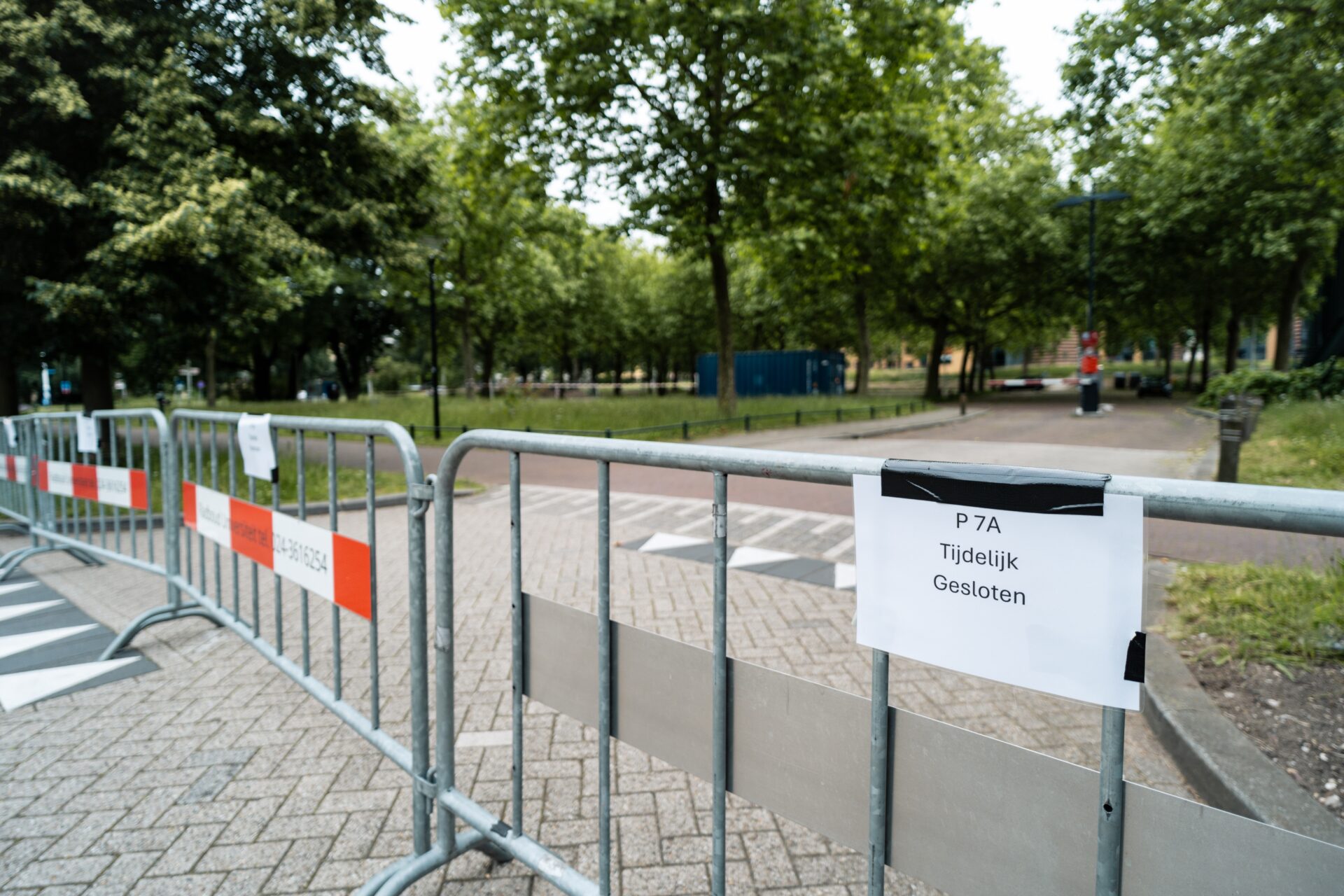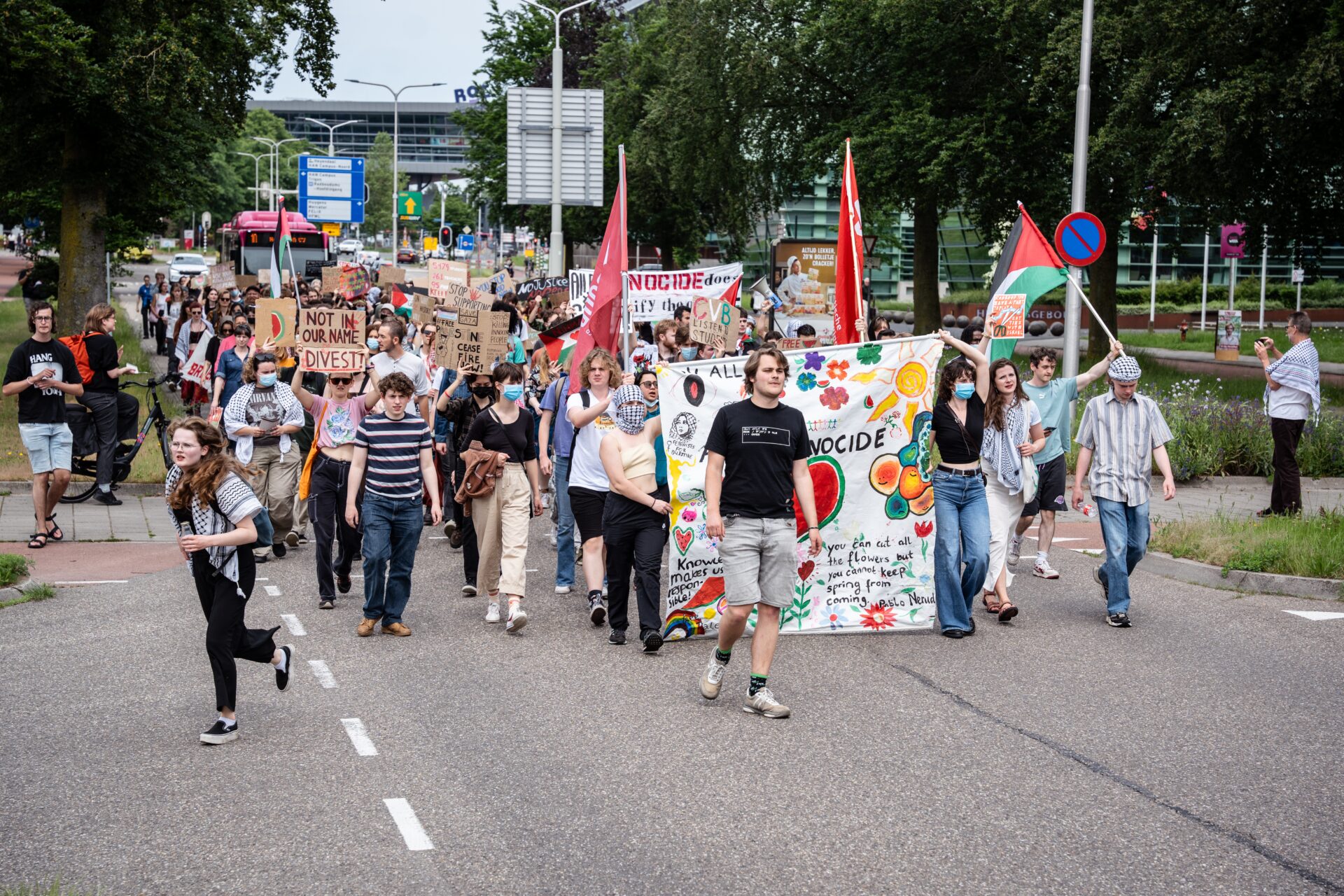Restrictions on protests: far-reaching or not? Constitutional Law lecturer: ‘The decision raises questions’
-
 Parkeerplaats 7A, de aangewezen plek voor de demonstraties. Foto. Johannes Fiebig
Parkeerplaats 7A, de aangewezen plek voor de demonstraties. Foto. Johannes Fiebig
Are the restrictions on pro-Palestine protesters an excessive restraint on the right to protest or a logical consequence of disturbances? Rian de Jong, associate professor of Constitutional Law, has some reservations about the mayor’s decision. ‘With this Bruls decides what is and is not possible in the future, and that is a bit strange.’
Since last week, Pro-Palestinian protesters have been banned from protesting at any central spots on the Radboud campus. Mayor Hubert Bruls has imposed some hefty restrictions on them. For instance, ‘Gaza/Pro-Palestine protesters’ are only allowed to protest between 08.00 and 20.00 on car park P7a. Also, any protest may only have a ‘static character,’ which means that, for example, no encampment or stage may be built.

In a council document, Bruls explains why he proceeded with these restrictions: ‘In the period from 13 May to 5 June 2024 (during the various pro-Palestine demonstrations ed.), several disorderly events took place, and criminal offences were committed by protesters. This is the reason for me to allow future protest by Gaza/pro-Palestine protestors to only go ahead under conditions.’
A relevant place
Banning almost the entire campus as a protest site is going way too far, several councillors from PvdA, GroenLinks, SP, and Partij voor de Dieren argued during the council meeting last Wednesday night. The board labelled the measures ‘severe measure, but necessary.’
“Protests almost always cause inconvenience and some nuisance”
Is mayor Bruls indeed out of line with the restrictions imposed? Rian de Jong, associate professor of Constitutional Law responds to questions from Vox. De Jong examines issues surrounding public-order enforcement and the protection of fundamental rights related to this.
‘Protests almost always cause inconvenience and some nuisance. In the interests of the right to demonstrate, as a society and government you just have to be content with that,’ the associate professor in Constitutional Law stressed, at the start of the interview. ‘If such a protest lasts longer, as in the recent case of a temporary encampment, then of course that nuisance lasts longer too. Whether that is still proportionate has to be weighed constantly.’

According to De Jong, what is very important for the right to demonstrate is that protesters can proclaim their message in a relevant place, preferably their own choice. ‘Relevant in the sense that people pass by and so they are heard and seen, but it can also be a symbolically relevant place. The pro-Palestinian protests took place at central locations on the university campus because the protesters want the university to change its policy towards contact with Israeli universities.’
The right to demonstrate
The right to demonstrate is the right of citizens to express themselves collectively in public spaces. It is established in the Constitution and the European Convention on Human Rights. This right allows citizens to express their views on what the government is doing. You can do that individually, in which case we talk about ‘freedom of expression,’ or in a group.
You can read more about protest rights in the Netherlands and demonstrating at educational institutions in a recent report by Amnesty International.
Question marks
Protesters have well-established rights in the Netherlands. If a mayor wants to ban or end a protest, he must be able to substantiate this securely, De Jong explains. Bruls substantiated his decision to clear the encampment on the 5th of June after the occupation and destruction at Thomas van Aquinostraat 1 (TvA), with sufficient arguments, according to the Constitutional Law professor.
‘The mayor points to several incidents that have resulted in considerable damage and destruction. He stresses that there has been intimidation and aggression and that the incidents have become increasingly more serious. Another reason he gives is that people have joined the protests who are not students or employees.’
What he does not explicitly mention, but which De Jong believes might play a role, is that the protesters had enough time to express their views at the site of their first choice. ‘The encampment has been there for a relatively long time at 24 days.’

However, De Jong questions the restrictions on future pro-Palestine demonstrations on campus. These include the decision that protests can only take place in the parking lot designated by mayor Bruls. ‘That decision raises questions. If protestors want to achieve something, they obviously need to be able to be seen and heard. Whether this spot was a fortunate choice…”
De Jong thinks it’s debatable that erecting a podium during a demonstration is not allowed and that such a demonstration may only have a ‘static character’: ‘It would have been good if there had been an explanation for this, which is currently still missing.’
Going to the administrative court
Moreover, according to De Jong, Bruls decided what will and will not be possible in the future. ‘And that is a little strange, because ‘future protests,’ sounds like a very long time. He could also have said ‘I will end this demonstration and then wait and see what happens next.’ Maybe he didn’t do it that way because the first demonstration also started without notice, I don’t know.’
‘The protestors can object to the mayor and also go straight to the administrative judge’
However, De Jong also points to the responsibility of organising protests. ‘As protesters, you also have a responsibility. If you want to be given space to demonstrate, you must be able to give sufficient guarantees that you can control the group and that it will remain peaceful. That has not happened now.’
The protestors are not left completely empty-handed after Brul’s decision. ‘They can object to the mayor and then also go straight to the administrative judge for a so-called injunction (a special measure that applies while the objection is still pending, ed.). If the administrative judge thinks the mayor’s decision will not stand, he can suspend it.’ Should the mayor’s decision on the objection turn out to be negative for the protestors, they can challenge it again in the administrative court if they wish.
Translated by Lieke Stevens



